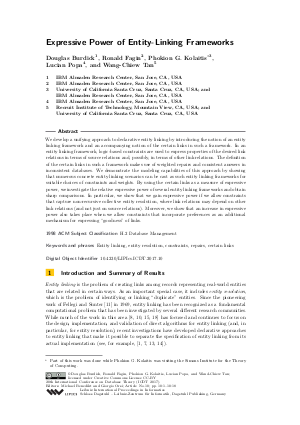Expressive Power of Entity-Linking Frameworks
Authors Douglas Burdick, Ronald Fagin, Phokion G. Kolaitis, Lucian Popa, Wang-Chiew Tan
-
Part of:
Volume:
20th International Conference on Database Theory (ICDT 2017)
Part of: Series: Leibniz International Proceedings in Informatics (LIPIcs)
Part of: Conference: International Conference on Database Theory (ICDT) - License:
 Creative Commons Attribution 3.0 Unported license
Creative Commons Attribution 3.0 Unported license
- Publication Date: 2017-03-17
File

PDF
LIPIcs.ICDT.2017.10.pdf
- Filesize: 0.54 MB
- 18 pages
Document Identifiers
Subject Classification
Keywords
- entity linking
- entity resolution
- constraints
- repairs
- certain links
Metrics
- Access Statistics
-
Total Accesses (updated on a weekly basis)
0Document
0Metadata
Abstract
We develop a unifying approach to declarative entity linking by introducing the notion of an entity linking framework and an accompanying notion of the certain links in such a framework. In an entity linking framework, logic-based constraints are used to express properties of the desired link relations in terms of source relations and, possibly, in terms of other link relations. The definition of the certain links in such a framework makes use of weighted repairs and consistent answers in inconsistent databases. We demonstrate the modeling capabilities of this approach by showing that numerous concrete entity linking scenarios can be cast as such entity linking frameworks for suitable choices of constraints and weights. By using the certain links as a measure of expressive power, we investigate the relative expressive power of several entity linking frameworks and obtain sharp comparisons. In particular, we show that we gain expressive power if we allow constraints that capture non-recursive collective entity resolution, where link relations may depend on other link relations (and not just on source relations). Moreover, we show that an increase in expressive power also takes place when we allow constraints that incorporate preferences as an additional mechanism for expressing "goodness" of links.
Cite As Get BibTex
Douglas Burdick, Ronald Fagin, Phokion G. Kolaitis, Lucian Popa, and Wang-Chiew Tan. Expressive Power of Entity-Linking Frameworks. In 20th International Conference on Database Theory (ICDT 2017). Leibniz International Proceedings in Informatics (LIPIcs), Volume 68, pp. 10:1-10:18, Schloss Dagstuhl – Leibniz-Zentrum für Informatik (2017)
https://doi.org/10.4230/LIPIcs.ICDT.2017.10
BibTex
@InProceedings{burdick_et_al:LIPIcs.ICDT.2017.10,
author = {Burdick, Douglas and Fagin, Ronald and Kolaitis, Phokion G. and Popa, Lucian and Tan, Wang-Chiew},
title = {{Expressive Power of Entity-Linking Frameworks}},
booktitle = {20th International Conference on Database Theory (ICDT 2017)},
pages = {10:1--10:18},
series = {Leibniz International Proceedings in Informatics (LIPIcs)},
ISBN = {978-3-95977-024-8},
ISSN = {1868-8969},
year = {2017},
volume = {68},
editor = {Benedikt, Michael and Orsi, Giorgio},
publisher = {Schloss Dagstuhl -- Leibniz-Zentrum f{\"u}r Informatik},
address = {Dagstuhl, Germany},
URL = {https://drops.dagstuhl.de/entities/document/10.4230/LIPIcs.ICDT.2017.10},
URN = {urn:nbn:de:0030-drops-70554},
doi = {10.4230/LIPIcs.ICDT.2017.10},
annote = {Keywords: entity linking, entity resolution, constraints, repairs, certain links}
}
Author Details
References
-
Arvind Arasu, Christopher Re, and Dan Suciu. Large-Scale Deduplication with Constraints using Dedupalog. In ICDE, pages 952-963, 2009.

-
Marcelo Arenas, Leopoldo E. Bertossi, and Jan Chomicki. Consistent Query Answers in Inconsistent Databases. In PODS, pages 68-79, 1999.

-
Stephen H. Bach. Hinge-Loss Markov Random Fields and Probabilistic Soft Logic: A Scalable Approach to Structured Prediction. PhD thesis, University of Maryland, 2015.

-
Stephen H. Bach, Matthias Broecheler, Bert Huang, and Lise Getoor. Hinge-Loss Markov Random Fields and Probabilistic Soft Logic. CoRR, abs/1505.04406, 2015.

-
Indrajit Bhattacharya and Lise Getoor. Collective Entity Resolution in Relational Data. TKDD, 1(1), 2007.

-
Matthias Bröcheler, Lilyana Mihalkova, and Lise Getoor. Probabilistic Similarity Logic. In UAI 2010, Proceedings of the Twenty-Sixth Conference on Uncertainty in Artificial Intelligence, Catalina Island, CA, USA, July 8-11, 2010, pages 73-82, 2010.

-
Douglas Burdick, Ronald Fagin, Phokion G. Kolaitis, Lucian Popa, and Wang-Chiew Tan. A Declarative Framework for Linking Entities. ACM Trans. Database Syst., 41(3):17, 2016. Preliminary version appeared in ICDT, pages 25-43, 2015.

-
Xin Dong, Alon Y. Halevy, and Jayant Madhavan. Reference Reconciliation in Complex Information Spaces. In SIGMOD, pages 85-96, 2005.

-
Jianfeng Du, Guilin Qi, and Yi-Dong Shen. Weight-Based Consistent Query Answering over Inconsistent SHIQ Knowledge Bases. Knowl. Inf. Syst., 34(2):335-371, 2013.

-
Ahmed K. Elmagarmid, Panagiotis G. Ipeirotis, and Vassilios S. Verykios. Duplicate Record Detection: A Survey. IEEE TKDE, 19(1):1-16, 2007.

-
Ivan P. Fellegi and Alan B. Sunter. A Theory for Record Linkage. J. Am. Statistical Assoc., 64(328):1183-1210, 1969.

-
Haim Gaifman. On Local and Non-Local Properties. Proc. Herbrand Symp. - Logic Colloquium '81, 1982.

-
Helena Galhardas, Daniela Florescu, Dennis Shasha, Eric Simon, and Cristian-Augustin Saita. Declarative Data Cleaning: Language, Model, and Algorithms. In VLDB, pages 371-380, 2001.

-
Mauricio A. Hernández, Georgia Koutrika, Rajasekar Krishnamurthy, Lucian Popa, and Ryan Wisnesky. HIL: A High-Level Scripting Language for Entity Integration. In EDBT, pages 549-560, 2013.

-
Mauricio A. Hernández and Salvatore J. Stolfo. The Merge/Purge Problem for Large Databases. In SIGMOD, pages 127-138, 1995.

-
Hanna Köpcke and Erhard Rahm. Frameworks for Entity Matching: A Comparison. Data Knowl. Eng., 69(2):197-210, 2010.

-
Hanna Köpcke, Andreas Thor, and Erhard Rahm. Evaluation of Entity Resolution Approaches on Real-World Match Problems. PVLDB, 3(1):484-493, 2010.

-
Nick Koudas, Sunita Sarawagi, and Divesh Srivastava. Record Linkage: Similarity Measures and Algorithms. In SIGMOD, pages 802-803, 2006.

-
Leonid Libkin. Logics with Counting and Local Properties. ACM Transactions on Computational Logic, 1(1):33-59, 2000.

-
Leonid Libkin. Elements of Finite Model Theory. Texts in Theoretical Computer Science. An EATCS Series. Springer, 2004.

-
Andrei Lopatenko and Leopoldo E. Bertossi. Complexity of Consistent Query Answering in Databases Under Cardinality-Based and Incremental Repair Semantics. In ICDT, pages 179-193, 2007.

-
Matthew Richardson and Pedro Domingos. Markov Logic Networks. Machine Learning, 62(1-2):107-136, 2006.

